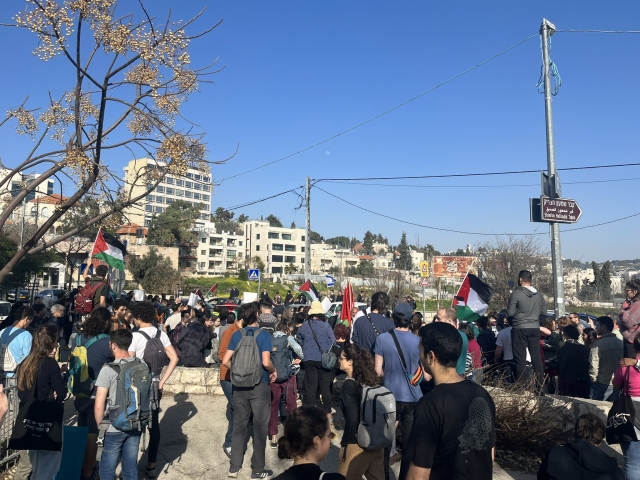Israeli civil enforcement authorities have plans to evict six Palestinian families from their homes in East Jerusalem within the month of March. This number is a record for evictions in one month and it comes just as Muslims are preparing for Ramadan, a time when tensions are already high. Add in the upcoming Passover holiday, a time when many Jews ascend the Temple Mount and security forces are expecting to have their hands full.
In the explosively controversial neighborhood of Sheikh Jarrah, the Salems, a family of 11 people consisting of three generations including four small children, is facing eviction. Last year, after the evictions were approved, the family petitioned the Jerusalem Magistrate's Court, which ruled in their favor in April 2022 and returned the case to the Enforcement and Collection Authority, for further investigation and a further hearing to be held on March 9. If the authority decides in favor of the original property owners that the Salem family failed to pay rent, the eviction is expected to take place this month.
IOF attacked a peaceful protest on Friday, demonstrating against possible expulsion of Palestinian families from their homes in Sheikh Jarrah neighbourhood in occupied Jerusalem. pic.twitter.com/8rPHhIBDBd
— Chris Hutchinson (@ChrisHu34451470) March 5, 2023
The evictions are conducted on the basis of the Legal and Administrative Arrangements Law, according to which families who owned land and property in East Jerusalem before 1948 and can prove it through land titles, deeds, British Mandate or Ottoman records can claim ownership of them. Some are less complicated and are simply landlord-tenant disputes where the tenants failed to or have refused to pay rent, in some cases going back decades, despite their signatures on lease agreements and past history of on-time payments.
Yonatan Yosef, the legal owner of one of the properties and a member of Jerusalem's City Council said: "I think it is a disgrace that a property I own on paper in the center of Jerusalem is occupied by squatters who use legal proceedings to steal from me and live in the property rent free. Only a year ago Jews did not give in to threats and terrorism during which time evictions were happening from the upper part of the neighborhood. There, too, all the enemies of Israel threatened and nothing happened." Yosef was describing the influx of foreign activists trying to prevent the evictions on the grounds that the area was Arab-owned, however after exhaustive and surprisingly comprehensive hearings that revealed the extent of Arab land theft in the area, the neighborhood was vacated.
1/3 Yesterday in Sheikh Jarrah
— JLM Anarchists (@JLManarchists) March 4, 2023
Weekly Friday demo took place, especially in support of Salem family, in danger of being displaced in the near future from their home by the zionist colonial regime. Settler and Jlm municipality board member Yonatan Yosef claims their home pic.twitter.com/7rwpyIs0Iq
When Jordan seized control over the area during Israel's war of independence, they systematically evicted Jews from the Eastern part of the city and confiscated the land, and structures owned by Jews, and handed them to Arabs in an effort to erase Jewish presence from the land. Some families still have the land titles and surprisingly, many of the buildings are still standing. Since 1967 when Israel regained control over the area, many Arabs were allowed to stay in the homes, signing the lease and rental agreements with the owners which were honored up until the second Intifada. Since the early part of this century, many Arabs stopped paying and for years the cases have made their way through the Israeli judicial system.
Judith Oppenheimer, CEO of the pro-Palestinian “Ir Amim” association, said that "if the evacuation goes ahead, six families will lose their roof over their heads, which is the most basic condition for proper human existence. Losing a home, beyond the economic damage, leads to damage to family and community life and a severe mental crisis, for both children and adults."
Since you defend kleptocracy and klepto history, clarify who Sheikh Jarrah belongs to pic.twitter.com/I2QtR8tZxb
— Laila Yoret (@LailaYoret) March 4, 2023
According to her, "In the long term, the danger of deportation threatens entire communities in Silwan, Sheikh Jarrah, and the Old City, numbering more than a thousand people. These are communities that some came to the area as refugees during the 1948 war, after being forced to leave their homes. They are about to lose their homes. This is possible with the help of a series of discriminatory laws enacted by the Israeli Knesset."
NOW: Huge turn out of Palestinian and Israeli activists to protest displacement in #SheikhJarrah.
— Uri Agnon (@UriAgnon) March 3, 2023
Next week there's a crucial court hearing for the Salem family. Settler orgs are using racist laws to displace them, and many more families in the neighborhood.@FreeJerusalem1 pic.twitter.com/Wfhm1AMrvd
While admitting that these families moved into homes in 1948 that did not belong to them, Ms. Oppenheimer neglected to mention the fact that the six families have refused to honor their leases and have not claimed hardship as the reason, rather the non-payment is a form of activism in itself. Organizations like Ir Amim (City of Nations) are not interested in paying the owners what is owed, rather they are seeking a settlement that gives the Arab families ownership over the land outright, ignoring prior agreements and court orders.


